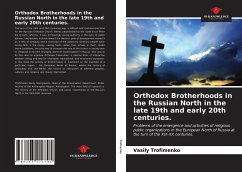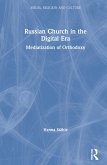The turn of the 19th and 20th centuries was a difficult and controversial time for the Russian Orthodox Church. Being subordinated to the state since Peter the Great's reforms, it was increasingly losing authority in the eyes of public opinion. Intellectuals inclined toward the Western path of development viewed it as a relic of antiquity and a mainstay of the autocracy. Ordinary people were losing faith in the clergy, seeing faults rather than virtues in them. Under these conditions, the only way to increase the role of the church in society was to integrate it into the changing world of modernization in Russia. One way to do this was to organize Orthodox fraternities, a special form of interaction between clergy and laity for charitable, educational, and missionary purposes. In this book the activity of brotherhoods is examined on the example of a particular region - the European North of Russia, where the history of Orthodoxy and Old Belief, the history of interaction of different peoples, cultures and religions are closely intertwined.
Hinweis: Dieser Artikel kann nur an eine deutsche Lieferadresse ausgeliefert werden.
Hinweis: Dieser Artikel kann nur an eine deutsche Lieferadresse ausgeliefert werden.








